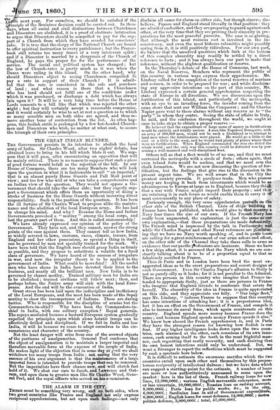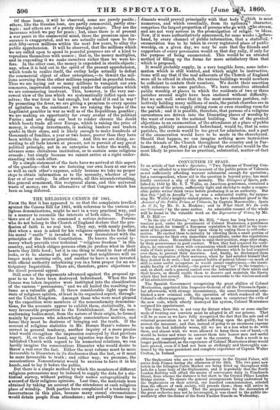THE ALARM IN THE CITY.
THERE must be something very wrung, and on both sides when two great countries like France and England not only express
reciprocal apprehensions, but act upon such feelings—not only disclaim all cause for alarm on either side, but though sincere, dis- believe. France and England stand literally in that position: they are afraid of each other, and they are preparing to guard against each other, at the very time that they are proving their sincerity in pre- parations for the most peaceful pursuits. The ease is so glaring, that although the most ruinous cost is involved in the in- consistency, and even the most hideous calamities might possibly spring from it, it is still positively ridiculous. For our own part, we believe that the unsolved questions which lurk at the bottom of this complex absurdity may readily be settled by a direct reference to facts ; and it has always been our part to make that reference, without the slightest qualification or reserve. In the Thursday's debate of the House of Commons, last week, on the Naval Reserves, Members who represent the public of this country in various ways express their apprehension. Mr. Lindsay called for the completion of the naval reserves of marines and seamen, in order to be prepared for war; and while disclaim- lag any aggressive intentions on the part of this country, Mr. Lindsay expressed a certain general apprehension respecting the state of Europe in all directions. We see discussions upon the fortification of this island, and particularly of the metropolis, with an eye to an invading force, the invader coming from the same shore that sent our William the Conqueror ; and Sir Charles Napier gave vent to these alarms without any reserve as to "the party" in whom they centre. Seeing the state of affairs in Italy, he said, and the confusion throughout the world, we ought at once to take steps to obtain a proper reserve :—
He believed that the expenditure of large sums of money in fortifications would be entirely and totally useless. A man like Napoleon Bonaparte, with an army of 600,000 men, would not be such a blockhead as to attempt to land men where the fortifications were placed. He would go a little to the east or a little to the west, and he would find plenty of places where there were no fortifications. When England commanded the seas she defied the whole world ; and the only way this country could be defended was by pos- sessing a well-manned and well-diseiplined fleet.
Others tell us that a fleet would be of no use, and that we must surround the metropolis with a circle of forts; others again, that even inland forts would be useless, and that we must arm the
chalk formation. We are not now discussing the nest-ion of for- tification, but the feelings that give rise to the discussion in its present urgent tone. We are well aware that in the City the greatest anxiety prevails. It paralyses trade. Men who possess money are keeping it back from investments which would be.cs advantageous to Europe at large as to England, because they thi4 that a war with France might imperil their property ; and they are retaining it in such forms as would enable them to carry it iiff most conveniently to any place of safety.
_Curiously enough, the very same apprehension prevails on the other side of the British Channel. Lists of ships building in France have been published, which would give to that country a Navy four times the size of our own. If the French Navy has really been augmented, the explanation is just the same as our own explanation,—that these preparations are made defensively. The French mind is impressed by the talk in Parliamccit ; and while Sir Charles Napier and other Naval reformers are p'.oclaini- ing that we have no Navy worth speaking of, and in panic tones are calling for a great reinforcement of our arms ashore and afloat, on the other side of the Channel they take these calls to arms as evidences that our pacific Iflofessions are insincere. Since we have a few ships afloat, it is assumed that the Navy which we are con- stantly talking about is to be of a proportion equal to that so fabulously ascribed to France. Thus in Paris and in London have been bred the most ex- aggerated ideas as to the overt preparations and covert designs of each Government. Even Sir Charles Napier's allusion to Sicily is not so purely silly as it looks ; for it is not peculiar to the Admiral. There are persons in this country who imagine that France in- tended to appropriate Sicily, just as there are persons in Frame who imagine that England intends to confiscate that estate for herself. The absurdity of the idea in France is quite appreoiated on this side, and they appreciate our folly. "Our large fleet," says Mr. Lindsay, "induces Frame to suppose that this country has some intentions of attacking her ; it is a preposterous idea, but it has an effeot on the Government of France, and compels it also to increase its naval force, which again counteracts on this country. England spends more money because France does the same ; and because England spends money France spends it also." We know how absurd the-French apprehension is, and in Paris they have the strongest reason for knowing how foolish is our fear. If any higher intelligence looks down upon the two coun- tries, each alarmed at the other, each conscious of its own inno- cence, each arming itself to the teeth in the most frightful man- ner, each regretting that costly necessity, and each desiring that its own honest intentions could only be understood. But, we want a Beranger to report the reflections which must be suggested by such a spectacle here below. It is difficult to estimate the enormous sacrifice which the two countries entail upon each other and themselves by this prepos-
terous reciprocity of intellectual dulness ; but we have data which can suggest a starting-point for the estimate. A number of loans are more or less authoritatively announced to come upon the market : here is the list of them. French railway loans for new lines, 12,000,000&; various English mercantile enterprises, more or lees uncertain, 10,000,0001.; Russian loan Oil railway account, 8,000,000&; Paris loan for public works, ite., in the city,
6 000 0001. ; English loans for coast defences, 12,000, . , metro
politzin defence, 3,000,0001.; total, 57,000,000!.
6,000,0001.; Sardinian loan in aid of Government ex nc dare. Of these loans it will be observed, some are purely pacific ;
others, like the loans, loan, are partly commereial,_partly stra- tegic; and others are of a purely strategic nature. They are the Insurance which we pay for peace ; but, since there is at present a war panic in the commercial mind, there the premium upon in- surance is exaggerated, and we are actually called upon to fur- nish fifty-seven millions within the next few years, to allay, the public apprehension. It will be observed, that the millions which we are called upon to spend in peaceful purposes are of a kind to reproduce themselves with usance ; that is, the money multiplies, and in expending it we make ourselves richer than we were be- fore. In the other case, the money is expended in sterile objects ; nay, when it is laid out in the spirit of the present apprehension, which tends to realize itself, the outlay helps actually to defeat the commercial object of other enterprises,—to thwart the mil- lions accruing from the other millions expended in peaceful trade. Thus we are laying out so many millions to vanquish our own commerce, impoverish ourselves, and render the enterprises which we are commencing insolvent. This however, is the very nar- rowest view of the loss which we systematically inflict upon our- selves; the war fever is bad enough, but what if it end in war? By promoting the fever, we are giving a premium to every species of agitation on the continent ; we are raising the hopes of the Legitimist gambler in war as well as of the Republican gambler; we are making an opportunity for every avatar of the political Furies ; and are doing our best to render chronic the doubt which besets trade all over Europe, which is raising the price of money,. is closing investments, is making bankers and traders quake in their shoes, and is likely enough to make hundreds of thousands of families, a year or two hence, poorer than they have been within the present generation. And this we are doing, ac- cording to all foots known at present, not in pursuit of any great political principle, not in an enterprise to better the world, to advance some chivalrous institution, or to sustain some religious crusade ; but simply because we cannot arrive at a right under- standing With each other.
By a simple statement of the facts have we arrived at this aspect of the question—that we are fostering our own fears at our own as well as each other's expense, solely because we take no proper steps to obtain information as to the necessity, whether of our fear or of our outlay. In other words, all this misunderstanding, this general armament, this reciprocal alarm, and this universal waste of money, are the alternative of that Congress which has been so long deferred.



























 Previous page
Previous page